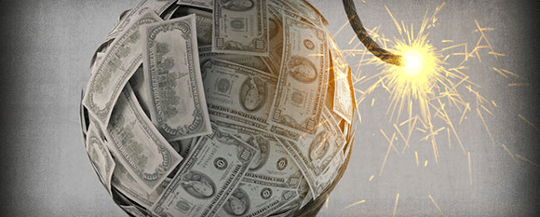The “New” Financial Weapons of Mass Destruction
Please. Blindfold your eyes.
Then grab a dart and heave it in the general direction of Wall Street.
If it doesn’t make you money… your dart-tossing just isn’t what it could be.
Such is the stock market, 2017.
Stocks trade near record highs.
Every random throw of the dart seems to find bull’s-eye… as if the bull’s-eye itself was a giant magnet… attracting the humblest stock that falls within its field.
But is it true? Are most stocks winners?
Goldman issued a report about the stock market Wednesday. “Eye-opening” might be one term to describe it.
“Scary” might be another.
Details to follow.
But first a look at the dart board…
The magnet’s faulty today. The Dow’s off 23 points. The S&P’s down four points of its own. But the Nasdaq’s up a nickel.
Gold’s up five bucks and change… for what it’s worth.
Now… if it seems that any old stock is a potential ticket to the good life, you might have another guess…
According to Goldman, a mere 10 stocks — 10 stocks — account for almost half the S&P’s gains for the year.
Forty-six percent, to be precise.
This year’s bull’s-eye stocks are the so-called FAANGs — Facebook, Amazon, Apple, Netflix and Google.
Rounding out the top 10 are Visa… Philip Morris… Oracle… Home Depot… and Broadcom.
Most other stocks are zeroes — or worse.
But the winners shine so brightly they blind.
David Stockman in yesterday’s reckoning:
“During the last 70 days, the FAANGs have gained $260 billion in value, while the other 495 companies in the S&P 500 have lost an identical amount… Other than the five FAANG stocks, the market has been silently collapsing since March 1.”
Meanwhile, recent data from Fundstrat Global Advisors reveal that just 40 stocks out of 500 — 8%, that is — account for some 85% of the S&P’s gains this year.
If you’ve had a tough time reconciling your own portfolio with the constant yak about record markets… you just might have your answer.
You picked the wrong darts.
Earlier we suggested the word “scary” to describe the foregoing.
But why?
Just throw in your lot with the FAANGs and maybe a handful of others. Then lie back on your oars. Let the rising tide lift your boat.
Ah, yes. But what happens when the tide rolls back out?
If just a handful of stocks drive the market higher, they can also drive it in the other direction.
Down.
And fast…
We recently reckoned about a creature called “risk parity.”
“Risk parity,” we wrote, “attempts to distribute risk across several asset classes by allocating more money to lower-volatility investments and less money to higher-volatility securities.”
Normally that might involve a bias for bonds over stocks — bonds generally offer less risk.
But stock market volatility has been so low lately, many stocks seem as sure as a three-month Treasury.
The FAANGs, for example.
So these risk parity funds have abandoned the tranquility of bonds for the easy waters of stocks.
It’s a type of “passive investing.” Passive, because it goes with the tide.
But when the tide recedes… it recedes.
If the market takes off in the wrong direction, risk parity funds will drop these stocks quicker than a wink.
Then the selling feeds and feeds and feeds upon itself… until there’s nothing left to eat.
Jim Rickards has called this type of passive investing “the new financial weapons of mass destruction.”
More:
They can “free ride” on the price discovery resulting from capital commitments by active managers and investors… In a bull market, the effect is to amplify the upside as indexers pile into hot stocks like Google and Apple. But a small sell-off can turn into a stampede as passive investors head for the exits all at once without regard to the fundamentals of a particular stock.
And the sting in the tail:
This is one more reason why the next stock market crash will be the greatest in history.
For the record… that history would include 1929… 1987… 2000… 2008.
Meanwhile, market volatility hovers around lows unseen in 24 years…
Risk parity funds snap up more “low risk” stocks…
And more darts sail for the bull’s-eye…
But we wouldn’t be a bit surprised if they hit a bubble on the way…
Regards,
Brian Maher
Managing editor, The Daily Reckoning



Comments: